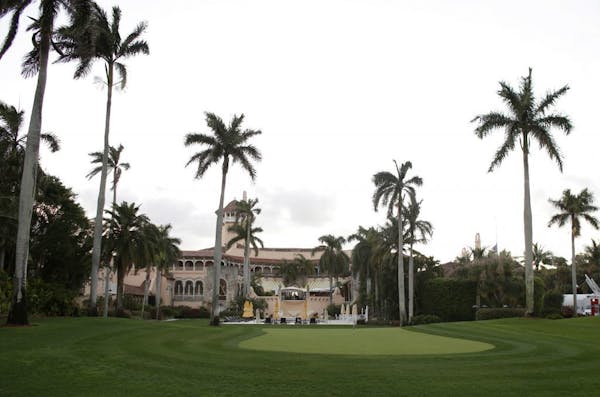A list of documents removed from former President Donald Trump's Florida residence, Mar-a-Lago, includes materials marked as top secret and meant to be viewed only in secure government facilities, according to a copy of the warrant reviewed by the New York Times.
Federal agents who executed the warrant did so to investigate potential crimes associated with violations of the Espionage Act, which outlaws the unauthorized retention of national security information that could harm the United States or aid a foreign adversary; a federal law that makes it a crime to destroy or conceal a document to obstruct a government investigation; and another statute associated with unlawful removal of government materials.
The search Monday seized 11 sets of documents in all, including some marked as "classified/TS/SCI" documents — shorthand for "top secret/sensitive compartmented information," according to the report. Sections of the warrant and an accompanying inventory were reported earlier in the The Wall Street Journal on Friday.
In total, agents collected four sets of top secret documents, three sets of secret documents and three sets of confidential documents, the Journal reported, saying it had reviewed the inventory of items taken in the search. Included in the manifest were also files pertaining to the pardon of Roger Stone, a longtime associate of Trump, and material about President Emmanuel Macron of France.
The inventory, which accompanied a warrant issued by a federal judge, is expected to be released as part of the Justice Department's efforts to make the warrant and some supporting materials public.
Calls and texts sent to Trump's lawyers were not immediately returned.
The warrant appears to have given agents fairly broad latitude in searching for materials deemed to be improperly stored at Mar-a-Lago, allowing access to "the 45 Office" and "all storage rooms and all other rooms or areas" on the premises that might be used to store documents.
Trump had announced late Thursday that he supported the Justice Department's legal effort to release the search warrant executed at his residence in Mar-a-Lago — with bravado and the suggestion that it was somehow his idea in the first place.
"Release the documents now!" he said amid a flurry of revelations about the investigation into his handling of White House documents, including some involving what one person briefed on the matter said were highly sensitive national security materials.
Trump's legal team had until 3 p.m. Eastern on Friday to officially respond to the Justice Department about whether he had any objection to the release of the search warrant and an inventory of items taken by federal agents during the search of his Florida home Monday. If there are no further legal or procedural wrinkles, Judge Bruce Reinhart, a magistrate in the Southern District of Florida, could make the documents public as early as Friday.
Trump has also been free to make them public himself.
Even without the documents, much is already becoming known about why Attorney General Merrick Garland, following the advice of the department's national security division, felt compelled to act to search the former president's home.
The search was carried out as part of the government's effort to account for documents that one person briefed on the matter said related to some of the most highly classified programs run by the United States. The person told The New York Times that investigators had been concerned about material from what the government calls "special access programs," a designation that is typically reserved for extremely sensitive operations carried out by the United States abroad or for closely held technologies and capabilities.
Previously, The Washington Post reported that some of that material might have been related to classified documents "relating to nuclear weapons," which could have been part of the special access programs designation.
On Thursday, Garland, tensely reading from a teleprompter, announced the department had asked Reinhart to unseal the warrant, a short document with limited information. But, as importantly, he also asked to make public key supporting documents, which include the items FBI agents were looking for Monday and what they ultimately carted away in sealed envelopes that were placed in boxes.
The most informative and sensitive document, an affidavit detailing the "probable cause" evidence that prompted Reinhart to approve the search, will not be released now, or probably ever, department officials said Thursday.
This article originally appeared in the New York Times.
